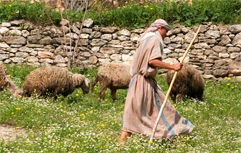
Vayigash: Shepherds by Choice
Jacob and his sons were relatively no less rich than the cattle magnates of today; why did they tend flocks all day long and choose to be shepherds?

"The men are shepherds, for they are cattlemen…" (Genesis 46:32).
When we hear the term “cattlemen”, an image of rich Texas ranchmen with tens of thousands of head of cattle enter our minds. Such ranchers ride horses for leisure and sport, but they're certainly not riding the range and tending their cattle; most likely, they're tending their investments…
Jacob and his sons, relative to their times, were no less rich than the cattle magnates of today. Despite this fact, the Torah stresses that they themselves were shepherds who personally tended the flocks. Not only were our holy forefathers shepherds, but Moses and King David were as well. Why did they all choose this type of work?
Rebbe Nachman of Breslev teaches[1] that the virtue of secluded personal prayer – hitbodedut – surpasses anything else. He mentions that the greatest tzaddikim attained their lofty spiritual heights particularly through persevering daily in this endeavor. Rebbe Nachman adds[2] that when a person  prays in the field, all the vegetation joins in his prayers, and helps him, giving his prayer extra power.
prays in the field, all the vegetation joins in his prayers, and helps him, giving his prayer extra power.
Our holy ancestors found four distinct advantages in being shepherds:
1. The work is relatively easy, not monopolizing the mind;
2. Raising sheep generates healthy revenues, for they are prolific and provide wool, milk and meat. What's more, if they have access to pasture or to open fields, there's little overhead in raising them;
3. Tending flocks takes a person far away from towns and cities and from other people; the shepherd is therefore spared from many transgressions such as evil speech and forbidden sights;
4. This occupation, considered an abomination by the ancient Egyptians to whom sheep were deities, enabled our forefathers to remain separate from them, thus maintaining their holiness and avoiding assimilation with the Egyptians.
With the above points in mind, we can understand why the Torah stresses that our forefathers were not only cattlemen, but shepherds as well. They chose to tend the flocks themselves.
Rabbenu Bachiya ben Asher writes[3] that secluded personal prayer far away from populated areas can bring a person to prophecy, for there aren't any other people around to disturb his thoughts of Hashem. He emphasizes, “The greatest prophets would go far away from populated ares and seclude themselves in prayer out in the wilderness, such as Elijah and Elisha…there, they would leave any physical preoccupations and totally cling with all their mental faculties to Hashem.”
The value of any endeavor in spirituality is measured by the degree of opposition it arouses. My esteemed friend Rabbi Moshe Elazar Moscowitz shlit'a told me a story about how the Satan appeared before the Chozeh of Lublin osb”m, and promised him any spiritual level he chooses on condition that he doesn't learn Gemara, and especially the sayings of the holy Amora Nachman bar Yitzchak. “From this,” said the Chozeh, “I understood just how important learning Gemara is, and just how valuable every tiny utterance of the holy Amora Nachman bar Yitzchak is.”
Repeatedly, in my own experience, I've seen how the evil inclination puts obstacles in the way of learning Gemara, especially in-depth learning. Yet, before going out to the field for a session of personal prayer, the evil inclination says, “Why do that? You haven't reviewed your Gemara yet…” From this, you can be sure how precious every moment of personal prayer is.
There are those who maintain that secluded personal prayer is something that was fine for our ancestors but no longer practical or applicable in this generation. That's not so! All of our latter-day spiritual leaders – Sephardim, Lithuanians and Chassidim – all write in praise of personal prayer and stress that it's the only way to genuine self-assessment, teshuva and proximity to Hashem.
Rebbe Natan of Breslev writes[4] that everyone, especially baalei teshuva, are in grave danger in this world, for as soon as they try to overcome evil, the evil gets stronger and overcomes them. As such, a person must flee to Hashem in daily personal prayer, seeking Hashem's help and mercy; as such, he will most certainly merit to return to Hashem wholeheartedly.” Amen!
[1] Likutei Moharan II:25
[2] Ibid, 11
[3] Rabbenu Bachiya on the Torah, Vayigash, “Veha'anashim”
[4] Likutei Halachot, Choshen Mishpat, Hilchot Hona'a, 3:2












Tell us what you think!
Thank you for your comment!
It will be published after approval by the Editor.